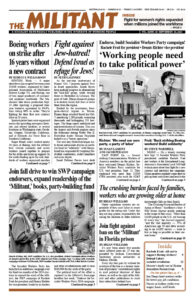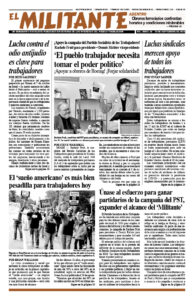EAST POINT, Ga. — Several striking Communications Workers of America members on the picket line here welcomed Dennis Richter, Socialist Workers Party candidate for U.S. vice president, Sept. 13. They explained why more than 17,000 CWA members who work for AT&T had walked out Aug. 16 across nine Southeastern states. “I’ve been raising the need for solidarity with your fight for a better contract as I campaigned in Dallas-Fort Worth and Pittsburgh,” Richter told them. “Solidarity is everything when you’re on strike.”
“They’ve been taking, taking, taking from us,” technician Kelvin Gordon said. “But now it’s enough. We need to feed our families, we need a roof over our heads! I have a co-worker who told me he watched his kids grow up on his cellphone. We all need time off to be with our families.”
“Many workers I’ve met across the U.S. and Canada are fighting for schedules that allow for family time, along with higher wages, benefits and safety on the job,” said Richter.
Val Edwards, an operating engineer who works at a local hospital in Atlanta and an endorser of the SWP ticket, accompanied Richter to the picket line and joined the discussion.
“I was living in Detroit last year and working at MotorCity Casino when union members at three casinos went on strike Oct. 17,” Edwards told the strikers. “We had five unions involved and 3,700 workers. We could see the power in our numbers, when thousands of us marched together downtown.
“We were fighting not just for ourselves, but for generations that will come after us,” she said. “We could see that the company was affected by the power of the strike and the solidarity we won.” The casino workers made important gains through the strike.
Gordon said they’re getting important solidarity from UPS workers in Atlanta who refuse to cross their picket lines.
Richter’s visit came two days before the union announced a tentative settlement Sept. 15 in the 30-day strike, the longest in the AT&T Southeast region’s history.
The union says the tentative new five-year contract includes wage increases of 19.33%, with additional 3% increases for lower-paid wire technicians and utility operations. Health care premiums remain the same for the first year, are lowered in the second and third, then raised again in the last two years of the contract.
A tentative four-year agreement was also reached for the 8,500 workers at AT&T West in California and Nevada who had also been on strike. Union members in both regions have yet to vote on the proposed contracts.
On Sept. 16, Richter joined a dozen UNITE HERE Local 23 members organizing to win support from passengers and other workers at Atlanta Hartsfield-Jackson International Airport. They’re concession and restaurant workers in the airport employed by Delaware North. They recently voted in the union and are now fighting for pay raises and a contract.
“They try to tell us we’re not smart enough,” Richter told Nayah, an organizer for the union, “but workers are the majority. We shouldn’t have to accept just the crumbs they offer us. They not only exploit us here, but also working people around the world, from Africa to Latin America to Asia.”
Nayah, who is originally from Gambia, was familiar with Thomas Sankara, who led a popular revolution in nearby Burkina Faso that held power from 1983 to 1987. “Sankara was murdered but people still look up to him,” she said.
“They should,” Richter said. “Sankara was a real revolutionary. He had confidence in working people. He taught people to organize to farm and to feed themselves and to look to other revolutionaries in Cuba and elsewhere.” Nayah and three others at the rally subscribed to the Militant.
Richter was a member of UNITE HERE Local 23 at Dallas-Fort Worth airport prior to setting out on the campaign trail.
Richter also spoke at an area-wide campaign meeting in Atlanta over the weekend that drew 25 people. They contributed $2,227 for the campaign. One participant asked him to explain more about the place of a party of labor in the class struggle today.
“We get interest in this,” Richter said. “We explain we are for a party of labor that can organize the entire working class on a course to take political power. It wouldn’t be an electoralist party.
“We are not for the so-called ‘labor’ parties that exist today in the United Kingdom, Australia and some other countries. They aren’t parties built on the unions charting a revolutionary road forward. They represent the capitalist rulers.”

